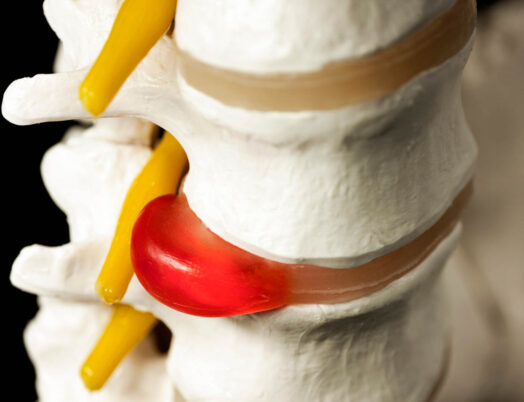
Traffic collisions, slip and fall accidents, and workplace injuries are some of the leading causes of neck and back trauma, which can leave victims suffering from a condition known as a herniated disc. Herniated discs can be incredibly painful and make everyday activities nearly impossible.
If you have been in an accident and suffered a herniated disc as a result, you may be able to pursue compensation from the person that caused the accident. Contact Brauns Accident Injury Lawyers, PC today for a free consultation with a skilled Lawrenceville herniated disc injury lawyer and find out how we can help you pursue the money and justice you deserve.
What Is a Herniated Disc?
The spine runs from the base of the brain down the back, supporting the body and relaying messages from the brain to the rest of the body. The spine is made up of different structures, including the bones known as vertebrae. In between these bones are soft tissues known as discs, which have a rubbery exterior and jelly-like center. The discs act as shock absorbers for the bones of the spine and prevent them from rubbing together.
A herniated disc occurs when the soft cushion is pushed out of the disc’s outer layer. This bulging can happen when the outer layer is ruptured, torn, or otherwise compromised. A herniated disc is sometimes called a slipped or ruptured disc.
Herniated Disc Symptoms
There is limited space inside the spinal canal. When a disc ruptures and the soft cushion is squeezed out, the material can press on delicate spinal nerves. The pressure can cause a variety of symptoms, such as the following:
- Pain in the neck or back
- Pain that radiates into the arms or legs
- Numbness or tingling
- Muscle weakness
Any pain in the back or neck needs to be addressed immediately by a medical professional. If you have been involved in an accident, you need to seek medical attention immediately.
What Causes Herniated Discs?
A herniated disc can be caused by gradual wear and tear on the spine. Age-related wear is typically called disk degeneration. Over time, the discs become less flexible. Even minor strains can result in a rupture or tear when this happens.
Herniated discs are most common in the lower back, known as the lumbar region. This region is prone to herniated discs because it supports the weight of the entire upper body. Lumbar discs are also commonly injured when people incorrectly lift or move objects using their lower back instead of their legs.
Herniated discs are also caused by trauma, which can be the result of:
Complications of Disk Herniation
A herniated disc is not a minor injury. Anything that puts pressure on the spinal cord can have dangerous complications on a person’s health, quality of life, and overall well-being. It can also result in a rare condition where the jelly-like inside of the disc compresses the entire spinal canal.
Other complications of a herniated disc may include the following:
- Worsening pain
- Continued numbness and tingling
- Loss of sensation
- Bladder and bowel dysfunction
- Permanent muscle weakness
- Paralysis
How Is a Herniated Disc Treated?
Treatment options for a herniated disc depend on the location and severity of the injury. In some cases, non-surgical treatments may be all that is needed. Rest is commonly prescribed for herniated disc patients. Lowering activity levels can help decrease spinal inflammation and give the body time to heal. Herniated discs may also be effectively treated with nonsteroidal anti-inflammatory medications.
In cases where the ruptured disc is causing severe pain, an epidural steroid injection may be needed. A cortisone-like medication is injected into the space around the nerve, providing some short-term pain relief. Physical therapy is another common treatment option for a herniated disc.
When symptoms do not respond to non-surgical treatments or if the disc is invading the entire spinal canal, a physician may recommend spinal surgery. A surgeon can remove a portion of the protruding disc, or they may need to remove the entire disc. Discectomy is the surgical process of removing the part of the disc that’s putting pressure on the spinal nerve.
How Much of a Settlement to Expect for a Herniated Disc
Many accident victims wonder what to expect in a herniated disc settlement. The answer is that it depends. The severity of your injury and how the injury was caused determine the value of your settlement. However, you can seek financial recovery for losses such as the following:
- Medical expenses
- Loss of income
- Pain and suffering
- Emotional distress
At Brauns Law Accident Injury Lawyers, PC, we are prepared to investigate the accident that injured you and gather evidence that supports your claim. We will then place an accurate and fair estimate on the value of your claim and fight to get you the money you deserve.













